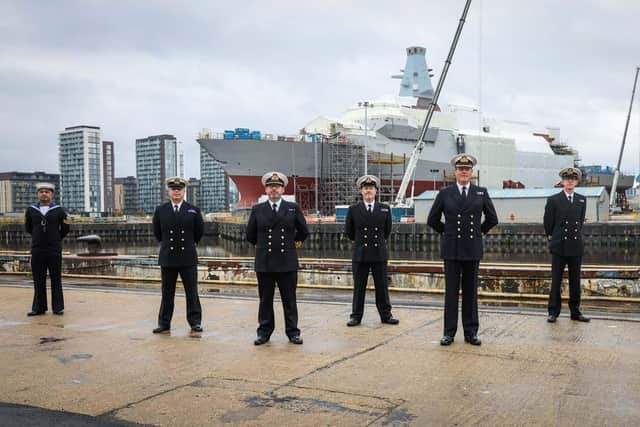Sailors join the first ship in the Royal Navy's new breed of hi-tech submarine hunters
This article contains affiliate links. We may earn a small commission on items purchased through this article, but that does not affect our editorial judgement.
and live on Freeview channel 276
Six sailors have joined HMS Glasgow – under construction in her namesake city – in a major milestone for the Type 26 frigate-building programme.
The ship is the first of eight Type 26 frigates which will safeguard both the nation’s nuclear deterrence and its aircraft carrier strike groups from interference from hostile submarines.
Advertisement
Hide AdAdvertisement
Hide AdGlasgow is currently on the hard-standing at BAE Systems’ yard in Govan, where shipwrights, technicians and engineers are completing the hull and superstructure.


The frigate, whose sponsor is the Duchess of Cambridge – known as the Countess of Strathearn when visiting Scotland – is sufficiently complete for the Royal Navy to begin assigning sailors to her.
The trailblazers will produce the ship’s ‘operators’ manual’: determining how HMS Glasgow will be run, her routines, her systems and sensors to make her an effective fighting force when she enters service later this decade.
Sir Simon Lister, managing director of BAE Systems' naval ships business, presented the ship’s first two junior ratings – Leading Writer Hayden Palmer and logistician Leading Hand Samuela Halofaki – with the inaugural HMS Glasgow cap tallies.
Advertisement
Hide AdAdvertisement
Hide Ad‘The ship’s company is the life-blood of a warship,’ said Commander Phil Burgess, both the warship’s marine engineer officer and senior naval officer – representing the commanding officer until one is appointed further along in the ship’s life.
‘With Royal Navy personnel joining HMS Glasgow for the first time, we have reached a key milestone that will enable the engineering, administrative and organisational foundations to be established.
‘These are necessary for a modern-day warship to function efficiently and effectively, and by starting now we can best support the build and transition into Service of HMS Glasgow.’
Leading Hand Samuel Halofaki will be responsible for making sure Glasgow has all the requisite equipment and stores aboard, as well as the supporting documentation.
Advertisement
Hide AdAdvertisement
Hide Ad‘I’m delighted to have joined as the first logistics expert in the first of ship of the Type 26 class. It’s exciting to be part of the team delivering a new ship into service in the Royal Navy and I’m looking forward to playing my part in that,’ said the father-of-three who has already helped to bring Portsmouth patrol ships HMS Trent, Tamar and Spey into service.
HMS Glasgow is the first of an initial batch of three ships all named after great UK cities, followed by HMS Cardiff and Belfast to be built as part of a £3.7bn defence deal.
Armed with a 5in gun and vertical-launch missile silo, the ships are due to operate from Devonport Naval Base.
Looking for the latest Royal Navy updates from Portsmouth? Join our new Royal Navy news Facebook group to keep up to date.
A message from the Editor, Mark Waldron
You can subscribe here for unlimited access to our online coverage, including Pompey, with 70 per cent fewer adverts for less than 20p a day.
Comment Guidelines
National World encourages reader discussion on our stories. User feedback, insights and back-and-forth exchanges add a rich layer of context to reporting. Please review our Community Guidelines before commenting.
